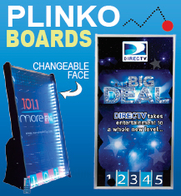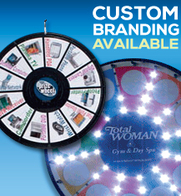Pinterest, everyone knows about it. If you are not using it you may want to check your head for a rock. Pinterest is one of the fastest growing online business referrals out there right now.

Pinterest can attribute most of its success to its simple outline and interface. Anyone can make an account and begin using it in minutes. As you use Pinterest you ‘pin’ images to a board for all to see. Much in the way you post status updates on Facebook. You can develop personalized boards and post images on any topic accompanied by creative captions, then your friends or business partners can comment or ‘like’ them.
Businesses have found that this tool is an excellent way to market to a large audience particularly at trade shows when you are looking to grab as much attention as possible. Much like it’s sister applications (Facebook, Twitter, and Instagram
) Pintrest allows real time photo capture and uploads. This makes it an excellent attention grabber at trade shows and big expo’s. It allows you to take images of what you’re doing and who you are with and show literally millions of users. Some expos and trade shows will even make a Pintrest page JUST for a specific event and allow vendors to submit photos of their booths to be featured on their boards.
Simply put, If you don’t have Pintrest you are missing out on a big market of potential customers and partners that use it exclusively and daily.
So how could something so easy to use get you caught up in a heated legal battle? The images most people decide to ‘pin’ are usually not checked for copyright. If you have a team that is not checking images you are associating with your Pintrest page you or your company brand could be in hot water. By pinning a photo to your board without giving appropriate credit to the photographer, you are saying you own the image. More and more people are finding out that this is not the best practice.
The Digital Millennium Copyright Act was enacted in response to claims brought on by photographers and other agencies that say their photos have been used without their permission on Pintrest and other social media sites. The Digital Millenium Copyright Act states that any company using a photo owned by someone else must have expressed written permission by the owner first and give appropriate authors credits wherever it is posted. For now this has been able to control copyright infringement on Pintrest. But here are some other steps you can take to insure you are within the bounds of the law.
- Make sure you have approval or own any images you pin. This means EVERY picture. Make a checklist to go over with anyone that will be using Pinterest under your company name.
- Do not create ‘fake’ customers. Do not have your employees online posing as customers giving your photos raving reviews. If you want to involve your employees on Pinterest have them make it clear that they do in fact work for the company whenever writing a comment.
- If you are having a hard time finding the owner of a specific photo, don’t use it. Sometimes it might seem easier to just take the photo anyway or Photoshop a few changes to make it appear different than the original, but in the long run finding another picture that you can get permission to use is always the better option.
- Use ORIGINAL PHOTOS! Wouldn’t you like to be attracting customers based on your own original ideas rather than pinning a photo many other people could possibly have already? Think about Google Image search, if you are using a photo used by other competitors they may come up in a Google search over you. Put a permanent end to this by only publishing original content on every social interface you participate in.
So remember, keep your Pinterest account legit and within the boundaries of the law. It is an invaluable tool but it can do irreparable damage to your brand if used carelessly.
About the Author
Shannon Martin is a trade show marketing consultant with more than a decade of experience in social media marketing, small business marketing, and trade show and conference marketing. She is the lead editor for TradeShowMarketing.Com and lives in Palm Coast, FL.
FaceBook



















